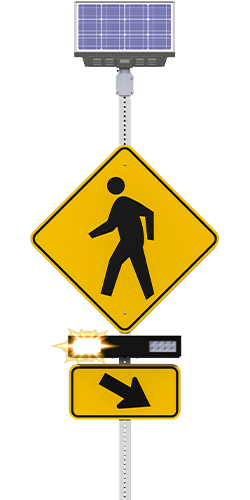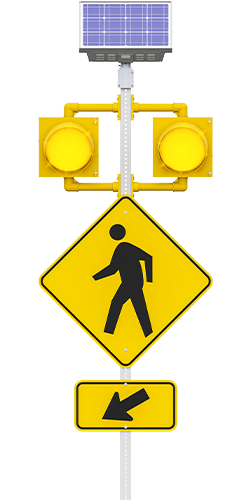MX SeriesTM
Overhead Lighting for Crosswalks
Increase visibility at mid-block crossings with a directional, compliant, and efficient LED light.
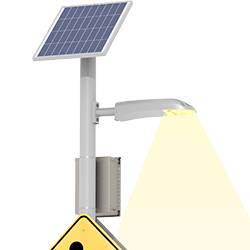
The number of pedestrian fatalities in North America has risen sharply in the past few years. According to the Governors Highway Safety Association (GHSA), 6,590 pedestrians in the United States were killed in traffic incidents in 2019, the highest number in more than 30 years.
Though there are many reasons for crashes involving pedestrians (cellphones, alcohol, excessive speed), numerous studies have found that inadequate lighting at or near crosswalks presents a heightened risk to pedestrians crossing the road. The nighttime fatal crash rate on unlit roads is almost twice as high as in well-lit areas, with nighttime crashes accounting for more than 90% of the total increase in pedestrian deaths in the past decade.
Crosswalks + connectivity:
R920-MX RRFBs
Our newest MX Series RRFBs take the already impressive capabilities of our best-selling R920 RRFBs and dials them up a notch—or two.
Here’s what you get with an MX RRFB:
- 3 years of free remote connectivity
- Actionable email and text alerts
- Remote system access via MX Cloud™
- Quick setup and local access with MX Field App™
- ‘Smart module’ design for simple installation and richer data
- Solar Power Report (SPR) prepared for every location
- Options for overhead lighting and accessible push buttons

Meets MUTCD Standards

Buy America / BABA compliant

3-year system warranty

Every MX system ships with 3 years free remote connectivity.
With MX, connectivity isn’t an add-on. We’ve embedded it into the hardware so that it automatically connects and reports to the cloud (and a free local app) the moment it receives power.
MX Lite
Get actionable alerts and a network-wide view of your systems.
3 Years Free | $79/year at year 4
Features (Core)
- Out-of-the-box connectivity
- System alerts (email/text)
- Remote asset management with GPS map view and more
MX Plus
Make changes to your system settings and access data from anywhere.
$99/year
All MX Lite features and
- Remote programming
- Knockdown alerts
- Data Charting
- …and more
MX Pro
Create, edit and set schedules in bulk and on-the-fly.
$249/year
All MX Plus features and
- Remote scheduling
- 5-year historical data
- Export functionality
- …and more
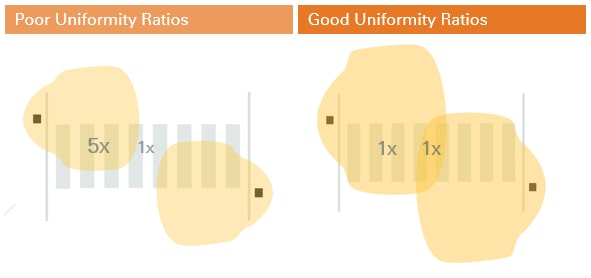
Bright, directional, uniform light, without the glare
Unlike other lights that prioritize brightness at all costs, Carmanah’s fixtures offer consistent light uniformity spanning the entire crosswalk area. This makes for better visibility, while reducing eye strain and “flicker” for both drivers and pedestrians. Our systems meet the Illuminating Engineering Society’s (IES) recommendation of a uniformity ratio of no more than 3:1 for mid-block crosswalks (average to minimum).
Streetlights aren’t enough
Even though many streets and roadways with mid-block crosswalks have streetlights, they are typically mounted high above the surface of the road and spaced far 100 ft. or more apart. They are designed to serve the needs of motorists in navigating and avoiding obstacles—not to illuminate a pedestrian or light an entire crosswalk area.
To do that, you need to provide enough concentrated, quality light that a driver can discern an incoming pedestrian at a sufficient distance for them to safely and appropriately react. In other words, you need a high-intensity, purpose-built pedestrian-level light that that maximizes the contrast and illuminance of pedestrians on or near the crosswalk. And that’s exactly what Carmanah’s crosswalk overhead lighting systems provide.
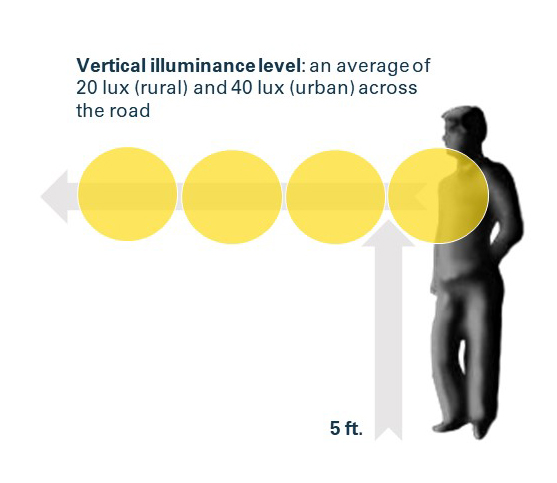
Vertical illuminance = pedestrian visibility
This consistency also allows for a much better level of vertical illuminance, or the amount of light that falls on a vertical surface (e.g. the profile of a pedestrian).
A study by the Virginia Tech Transportation Institute found that a vertical illuminance of 20 lux in a crosswalk, measured at 5 feet above the road surface, allowed drivers to detect pedestrians at adequate stopping distances under rural conditions.
When installed at an appropriate height and offset distance from the roadway, Carmanah’s systems can easily meet these specs, as well as higher vertical illuminance levels that may be required for urban/suburban crosswalks with greater levels of ambient light.
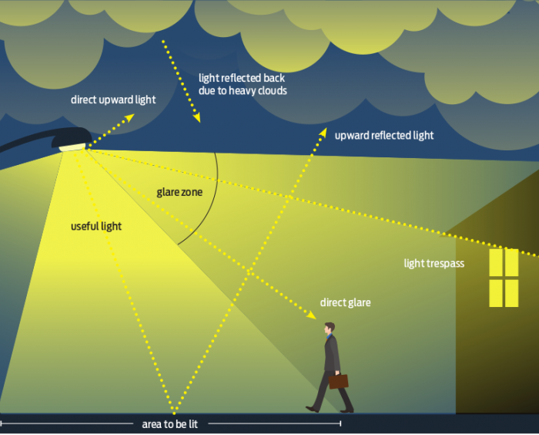
Reducing glare and light waste
Carmanah’s overhead crosswalk lights also minimize the kind of dangerous glare that characterizes unshielded and non-directional lights by employing flat glass luminaires mounted parallel to the roadway (versus at an angle, where light can “leak” upward into the night sky, or into nearby residences).
Not only does this reduce impacts to human health, wildlife, and the environment, it also makes for a much more efficient light, with less energy wasted.
Comparing light fixtures
There are several ways cities can achieve adequate light levels at crosswalks, but not all are equal. One approach is to use one or more floodlights, which project a very bright beam of light, but provide very little consistency or uniformity.
Whereas a floodlight might provide 70 lux in one place and 4 lux in another (still providing an average of 20+ lux), a more suitable light—such as a Type 3 optic LED roadway light—provides a consistent light that has with a more narrow range of 45 lux to 4 lux, (depending on the light layout) that puts less strain on the eye and creates a much safer environment.




Overhead crosswalk lighting in Hanover, NH
Since 1975, Dartmouth College’s Thompson Arena has hosted countless hockey practices, games, and celebrations. Game night can draw crowds as large as 3,500, arriving by car, bicycle, and on foot.
While the arena is located on one of the college’s main thoroughfares, there are few streetlights, and the existing crosswalk in front of the arena was difficult to see after dark.
Recognizing the need to improve visibility at this high-traffic crosswalk, the college worked with Carmanah and their local distributor, Coastal Traffic, to add purpose-built, pedestrian-scale overhead lighting. We recommended a solar-powered system that combined both an overhead Type 3 roadway lighting fixture with our popular and highly visible rectangular flashing beacons (RRFBs). Today, the system provides game-goers with a bright, safe place to cross the street both day and night.
Additional resources for overhead lighting
Video On-Demand
Overhead Lighting for Crosswalks: In this webinar, our business development manager Jesse Fraser explores how overhead lighting can help your city become brighter, safer, and more walkable. We cover overhead lighting design principles and effectiveness, how crosswalk lighting can increase safety and encourage walkability, the benefits of adding overhead lighting to Carmanah beacons, and configuration options and support tools.
Application Guide
Industry Standards and Recommendations Guide: We compiled this guide using information from two of the leading authorities in traffic safety and lighting, the Federal Highways Administration (FHWA) and the Illuminating Engineering Society (IES). It covers how pedestrian visibility is determined, how to achieve acceptable light levels, and glare, uniformity and other concepts of lighting design.
Video On-Demand
Overhead Lighting for Crosswalks: In this webinar, our business development manager Jesse Fraser explores how overhead lighting can help your city become brighter, safer, and more walkable. We cover overhead lighting design principles and effectiveness, how crosswalk lighting can increase safety and encourage walkability, the benefits of adding overhead lighting to Carmanah beacons, and configuration options and support tools.
Application Guide
Industry Standards and Recommendations Guide: We compiled this guide using information from two of the leading authorities in traffic safety and lighting, the Federal Highways Administration (FHWA) and the Illuminating Engineering Society (IES). It covers how pedestrian visibility is determined, how to achieve acceptable light levels, and glare, uniformity and other concepts of lighting design.
Get in touch
Have questions or need assistance? Connect with sales for product inquiries and quotes, support for technical issues, or visit the product support center for self-service resources.
